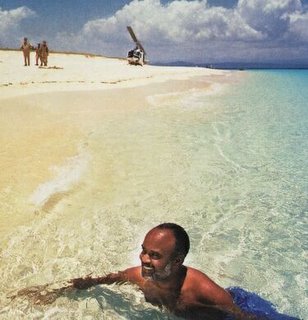 Despite numerous delays of the Haitian election, engineered by foreign powers to prevent a popular candidate from being chosen, Rene Preval is now President-elect. He has proclaimed that Jean-Bertrand Aristide may return to Haiti, something the foreign powers insist should not be allowed. But Preval doesn't stop there. He says any Haitian citizen may live in Haiti, even those who are known to have been death squad leaders, even those who were part of the foreign-sponsored coup against Aristide.
Despite numerous delays of the Haitian election, engineered by foreign powers to prevent a popular candidate from being chosen, Rene Preval is now President-elect. He has proclaimed that Jean-Bertrand Aristide may return to Haiti, something the foreign powers insist should not be allowed. But Preval doesn't stop there. He says any Haitian citizen may live in Haiti, even those who are known to have been death squad leaders, even those who were part of the foreign-sponsored coup against Aristide.Preval's argument? The Haitian constitution protects citizen's rights to live in Haiti. Are these just words or does Preval intend to live by these words? He is saying he intends to follow the supreme law of Haiti, its constitution, regardless of the difficulties that might result.
Elsewhere, adherence to law has eroded. Referring to international law, Shlomo Ben-Ami, former Israeli Foreign Minister, has said recently, "there are conditions where you cannot apply these lofty principles, which are very important, but you cannot apply them." [1] And in the U.S. we have Alberto Gonzales authoring a memo in January 2002 concluding that Article III of the Geneva Convention are obsolete as applied to captured Al Qaeda and Taliban fighters. [2] The Geneva Conventions are a treaty, adopted into US law by a ratification process. And the US President argues that he has the right to surveil US citizens as an unintended consequence of intercepting foreign electronic communications, despite the US constitution's fourth amendment requiring probable cause and a warrant. [3]
Is Haitian leader Preval serious about following the laws of his land? If so, he would be leading by example in a time when actions of US leaders demonstrate a distain for the rule of law, unless the laws are those written by corporate lobbyists to undermine the rights of the people.
NOTES:
1. DemoncracyNow! Interview 2/14/06
2. Gonzales authored a controversial memo in January of 2002 that explored whether Article III of the Geneva Convention even applied to Al Qaeda and Taliban fighters captured in Afghanistan and held in concentration facilities around the world, including Camp X-Ray in Guantanamo Bay, Cuba. The memo made several arguments both for and against providing Article III protection to Al Qaeda and Taliban fighters. He concluded that Article III was outdated and ill-suited for dealing with captured Al Qaeda and Taliban fighters. He described as "quaint" the provisions that require providing captured Al Qaeda and Taliban fighters "commissary privileges, scrip, athletic uniforms, and scientific instruments". He also argued that existing military regulations and instructions from the President were more than adequate to ensure that the principles of the Geneva Convention would be applied. He also argued that undefined language in the Geneva Convention, such as "outrages upon personal dignity" and "inhuman treatment", could make officials and military leaders subject to the War Crimes Act of 1996 if mistreatment was discovered. http://en.wikipedia.org/wiki/Alberto_Gonzales
3. Fourth Amendment: "The right of the people to be secure in their persons, houses, papers, and effects, against unreasonable searches and seizures, shall not be violated, and no Warrants shall issue, but upon probable cause, supported by Oath or affirmation, and particularly describing the place to be searched, and the persons or things to be seized."



No comments:
Post a Comment